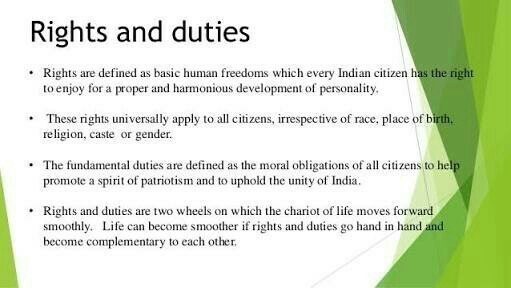[ad_1]
Introduction:
Fundamental Rights and Fundamental duties are correlative and inseparable. Also, the original constitution contained only the fundamental rights and not the fundamental duties.
The fundamental duties of citizens were added in the Constitution later in 1976 on the recommendation of Swaran Singh Committee. In 2002, one more Fundamental Duty was added.
Although both, Fundamental Rights and Fundamental Duties, are inseparable, there are certain differences between them.
Recently, Duties and Rights debate:
- On Constitution Day last month, many Union Ministers used the occasion to underline this proposal.
- The Minister of Law and Justice, claimed that our country can be made great only “if we create a balance between fundamental duties and fundamental rights.”
- The Minister for Culture, took this thought further still, today, on Constitution Day, it is important that we emphasize our fundamental duties for the growth and progress of our country.
- If deeper roots have to be established in a diverse and democratic country such as India, citizens will have to converge their inalienable fundamental rights with their fundamental duties.
- What is more, the link between fundamental rights and duties, according to him, was not merely a constitutional debate but a “civilisation discussion” — whatever that might mean.
- In recent times, there has been something of a constant refrain of the governing class to advocate an integration of duty with right.
- By duty here they do not mean the concomitant obligations that spring out of constitutional promises, but a set of ideals that were written into the Constitution during the acme of the Indira Gandhi-imposed Emergency.
- In their belief, these otherwise non-binding obligations — the “fundamental duties” as Article 51A describes them ought to be treated on a par with, if not superior to, the various fundamental rights that the Constitution guarantees.
In an inversion of the well-known dictum, they see duties, and not rights, as trumps.
Constituent Assembly deliberations on Rights and Duties:
- The Constituent Assembly was clear in its belief that the Constitution’s emphasis must always rest on individual dignity.
- That is, the Constitution’s chief purpose must be to preserve and guarantee basic human rights, to equality, to autonomy, and to liberty, among others.
- To the framers, the very idea of deliberating over whether these rights ought to be provisional, and on whether these rights ought to be made subject to the performance of some alien duty, was repugnant to the republic’s vision.
- But the importance placed on every person’s ethical independence did not mean that rights were seen as absolute warrants.
- After all, Part III of the Constitution, in which our fundamental rights are nestled, contains within it a set of limitations.
- However, none of those restrictions places a burden on citizens to perform duties as a condition for the enforcement of rights.
- The Constitution’s framers saw the placing of mandates on individual responsibilities as nothing more than a legislative prerogative.
- Any such imposition would have to conform to the language of fundamental rights, but Parliament was otherwise free to dictate personal behaviour.
- For example, the legislature could impose a duty on individuals to pay a tax on their income, and this duty could be enforced in a variety of ways.
- If the tax imposed and the sanctions prescribed were reasonable, the obligations placed on the citizen will be constitutionally valid.
Then, Introduction of Article 51A:
In its original form, the Constitution did not enlist any obligations that an individual was bound to follow.
The fundamental duties that are now contained in Article 51A were introduced through the infamous 42nd constitutional amendment.
The Swaran Singh Committee, which was set up during the Emergency, and which recommended the insertion of the clause, also suggested that a failure to comply with a duty ought to result in punishment.
In its finally adopted form, Article 51A encouraged citizens to perform several duties: among others, to cherish and follow the noble ideals that inspired the national struggle for freedom; to uphold and protect the sovereignty, unity and integrity of India; to defend the country and render national service when called upon to do so; to protect and improve the natural environment; and to safeguard public property.
However, Experts argued that Rights and Duties Go Hand in Hand:
Mahatma Gandhi in Hind Swaraj observed that “Real rights are a result of the performance of duty”.
Rights and duties are closely related and cannot be separated from one another. For every right, there is a corresponding duty.
The State protects and enforces rights and it is the duty of all citizens to be loyal to the state. Thus, a citizen has both Rights and Duties.
Those with power should not use it to exploit those from whom they wield it. It is only after guarantee to all the full sum of humanity, dignity, equality, and freedom promised by the Constitution, that we can ask of them to do their duty.
It is only after ensuring the humanity, dignity, equality, and freedom for all, as promised by the Constitution, that the burden of ‘following the duties’ should be imposed on the citizens.
Conclusion:
To sustain our society, to live peacefully together, we must take seriously our civic responsibilities.
But any talk aimed at making these obligations central, and at melding our rights with duties, is aimed only at undermining the Constitution. That this is so is clear from the history of fundamental duties in India.
The social revolution that the Constitution was meant to herald was underpinned by a belief that it is only a guarantee of rights, unimpeded by duty that could help usher India into a free and egalitarian future.
[ad_2]


